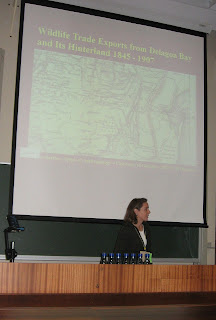Safari in Botswana
I've been putting off blogging about Botswana, mainly because of what happened to Chris and I in Chobe National Park (well, in Kasane just outside the park gates really). Our rental car was broken into one night, not 10 feet from where we were sleeping in our tent. We are fine and the only thing taken was my computer bag. But of course, it was what was in the bag that matters - my passport, a plane ticket to Pt. Elizabeth for a conference, my laptop, data, some books and electronic equipment, some rands and metacais, pictures I had downloaded from the trip so far, and my Wookiee. 
I can't believe someone stole my Wookiee. I'd love to have seen the look on their face when they pulled Chewbacca out of my bag. I brought my Chewbacca and Obi-Wan Kenobi figures along to take pictures in the Kalahari Desert for kicks. Silly, but hey, I was on a vacation.
The part that really had me worried was my passport. Everything else was pretty easy to replace (well except the pictures and market data) albeit expensive, and Chris and I are safe. It could have been much worse. But having your car broken into like that is still nerve wrecking.
I am still working on replacing my Mozambican visa. The temporary one I got in Pretoria runs out 20 August. I am blogging from a new laptop (an Acer 3680). I'll wait to replace the book I lost. South African Airways was really helpful in replacing my ticket - even if a paper ticket system is antiquated. My conference presentation went well and I managed to put together and deliver a presentation on the role of anthropology in conservation in less than a day. That also seemed to go well.
The Kasane Police were very nice, but I don't expect to see any of what I lost ever again. And we never made it to Victoria Falls. :(
Here are some pictures of our safari in Botswana post-theft. BTW I would still recommend visiting Botswana. Tracking rhinos and elephants on foot, poling the Okavanga Delta, and birding in the Kalahari is pretty amazing.
Getting fingerprinted at the Kasane Police Station. The Kasane CSI unit dusted our car for prints so we needed to have ours on file for the investigation.
Getting my new passport photo taken in Gabarone, Botswana. The US Embassy issued me a emergency passport within 4 hours. They had to run a background check and apparently I haven't done anything too horrible.
Many rural Botswanans use burros to get around. There are even cowboys (sorry, that picture got lost) who herd cattle on horseback in flipflops.
Botswanan road blocks - cattle are one of the most important thing to a Botswanan family.
Let's hope when the road is finished there is some money for a new sign.





















